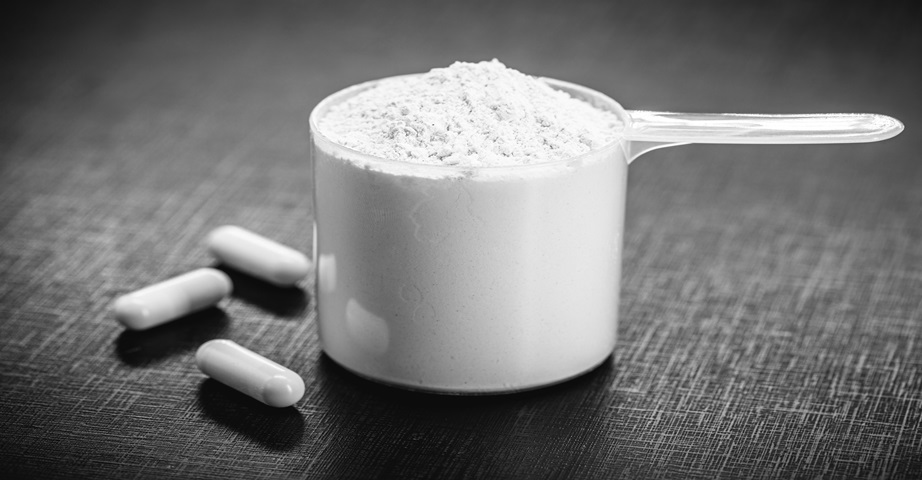Creatine monohydrate - properties, effects, side effects

Creatine monohydrate is one of the most popular dietary supplements available on the market, which is very popular among physically active people, especially athletes who want to maintain and increase muscle mass. This is one of the best studied forms of creatine, which can have a positive effect on the achievements and training results. Creatine monohydrate - what does it give? How to use creatine monohydrate? Is the compound safe?
Summary
What is creatine?
Creatine (or beta-methylguanidinoacetic acid) is an organic chemical compound that can be formed in the human body due to the presence of three amino acids - glycine, methionine and arginine. It is a component produced in the liver, kidneys and brain, which is stored primarily in skeletal muscles. The creatine can be delivered to the body also from the outside - along with the daily menu. Animal products such as meat, fish, milk or dairy products are considered to be the sources of the compound.
Due to the fact that physically active people are distinguished by an increased demand for the creatine, and the amount of the compound delivered to the body with food and naturally synthesized in the human body is small, a good solution among athletes may also be dietary supplements containing the desired ingredient.
Creatine monohydrate - what is it?
Because the creatine is very popular among both beginners and experienced athletes, regardless of the discipline, on the market of dietary supplements can be found many different forms of the creatine. The cheapest and most popular form of the compound is creatine monohydrate, which is one of the best studied dietary supplements.
The creatine monohydrate is the simplest form of the compound in terms of structure. It is a combination of a creatine molecule with a water molecule, in which creatine accounts for about 90%, while water - 10% of the substance.
Recommended dietary supplement with creatine monohydrate
Creatine monohydrate - action
The creatine monohydrate is a dietary supplement that is most often used in strength sports, which is due to the fact that the substance can stimulate protein synthesis, promoting the increase of muscle mass.
In the human body, about 2/3 of the creatine, produced by natural synthesis, as well as supplied to the body with food and supplements, is in the form of phosphocreatine, which can contribute to the reconstruction of ATP, which allows increasing the amount of energy produced in the body, and thus affects the ability to perform and continue the effort.
The creatine monohydrate can retain water in the human body, and thus can contribute to rapid weight gain, which is appreciated in particular among people who care about express weight gain.
Creatine monohydrate - effects
The use of the creatine monohydrate can promote the building of muscle mass and maintain the muscles developed so far. Moreover, in the case of physically active people, the compound can stimulate the synthesis of insulin-like growth factor IGF-1, positively affect single and multiple series of short-term high-intensity exercises, and it can also intensify adaptations to physical training. The ingredient can also affect the exercise capacity, increasing the strength and physical performance of athletes.
The use of creatine in the form of monohydrate can cause increased ATP synthesis, and thus can facilitate longer and more demanding workouts. The creatine monohydrate can be successfully used not only by athletes of strength and figure disciplines, but also by endurance and speed players. Scientific research also suggests that the creatine monohydrate in combination with resistance training can positively affect the functioning of older people, reducing the risk of fractures and positively affecting bone aging.
The substance can also be helpful after intensive physical exercise. The creatine monohydrate can support tissue reconstruction and repair of microdamages, supporting regenerative processes and enabling faster readiness to perform the next training. Moreover, the compound may delay the appearance of fatigue and reduce the risk of soreness and delayed muscle pain (DOMS).

Creatine monohydrate - how to take?
The creatine monohydrate is a safe dietary supplement, which, when used in accordance with the manufacturer's recommendation in recommended amounts, should not contribute to the occurrence of undesirable symptoms and effects.
There are two methods of taking preparations containing the creatine monohydrate. The compound can be delivered to the system in accordance with:
- the saturation phase, which consists in consuming significant amounts of the substance (20-30 g of the creatine monohydrate) for the first few days of supplementation, and then reducing the amount of the compound delivered to the body to 3-5 g per day,
- the constant amount of product delivered to the body in equal portions - including 5-10 g of the creatine monohydrate every day, regardless of whether it is a training day or not.
The use of creatine in accordance with the saturation phase allows you to quickly saturate the muscles with a valuable component, and at the same time contributes to a sharp increase in body weight. In turn, taking the compound in a constant portion does not cause drastic weight gain, but at the same time ensures slower achievement of the intended goal. Regardless of the chosen method of taking a dietary supplement, the use of preparations containing the creatine monohydrate allows saturation of muscles with the desired compound, which can have a positive effect on training efficiency.
Creatine monohydrate - side effects and contraindications
The creatine monohydrate is considered a safe compound that does not contribute to the occurrence of undesirable side effects. However, among physically active people taking excessive amounts of the substances, can be observed symptoms such as nausea, diarrhea or dehydration.
The creatine monohydrate should not be used by people allergic to any of the ingredients of dietary supplements. Particular care should be taken by people struggling with liver and kidney diseases - before starting taking creatine monohydrate preparations, it is worth consulting the attending physician.

